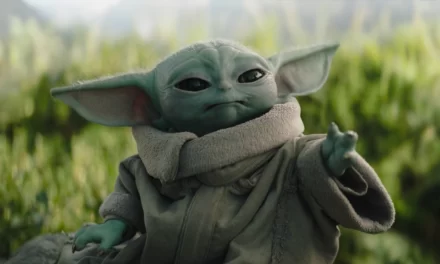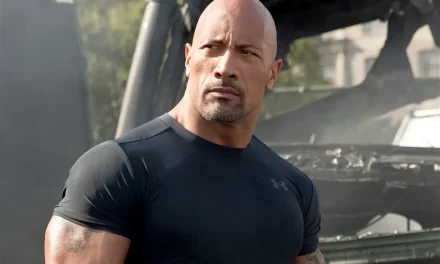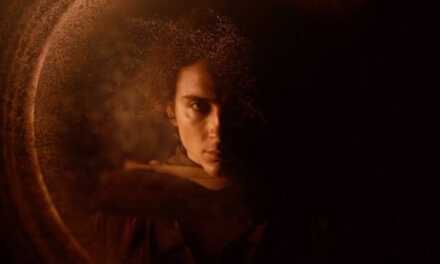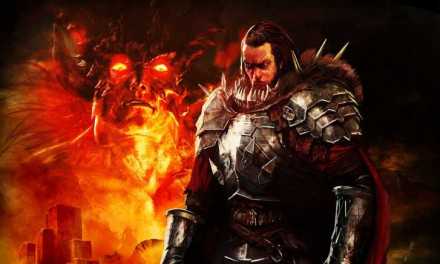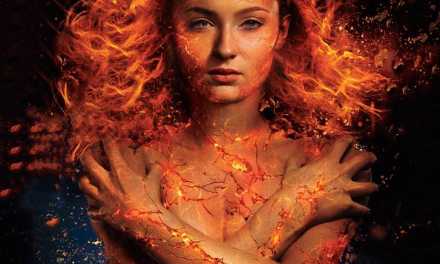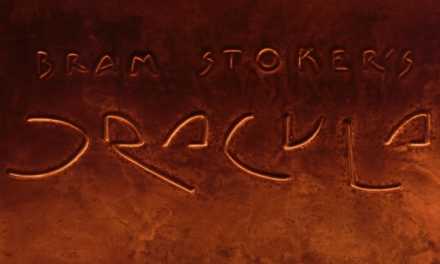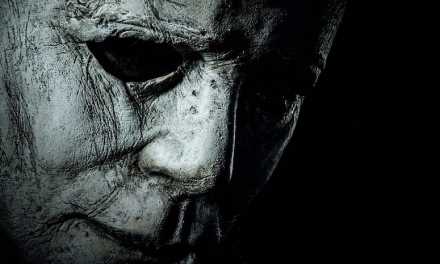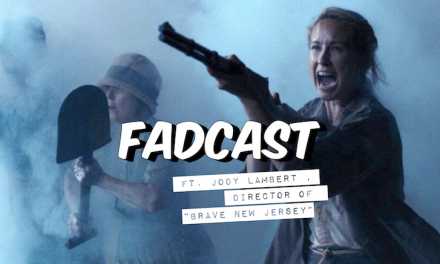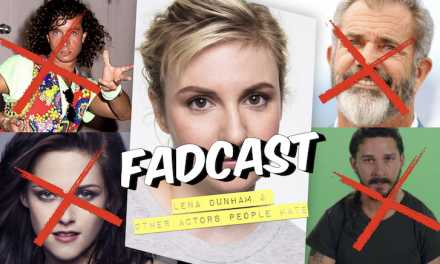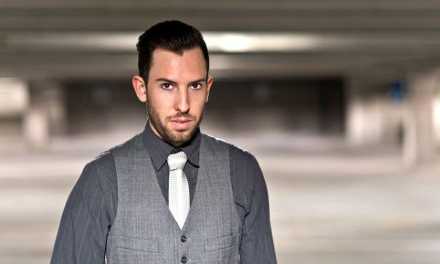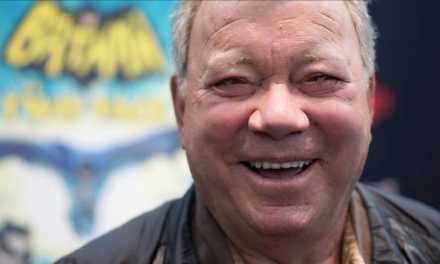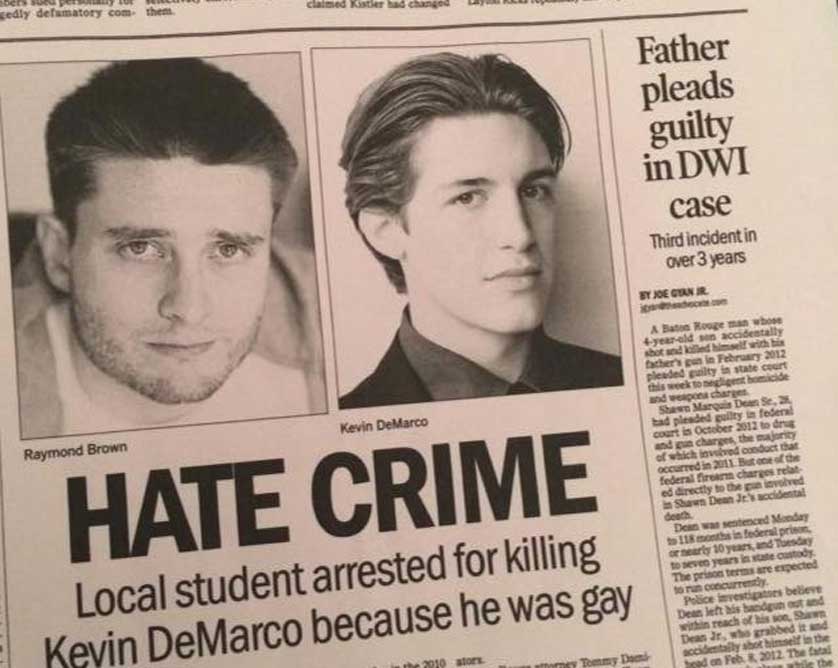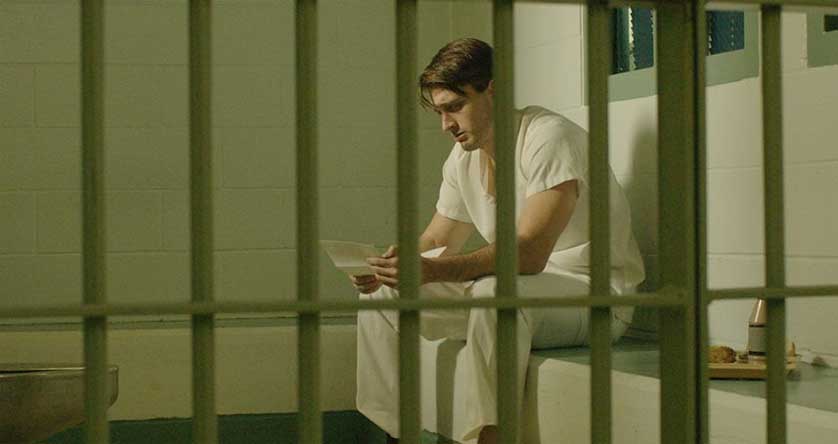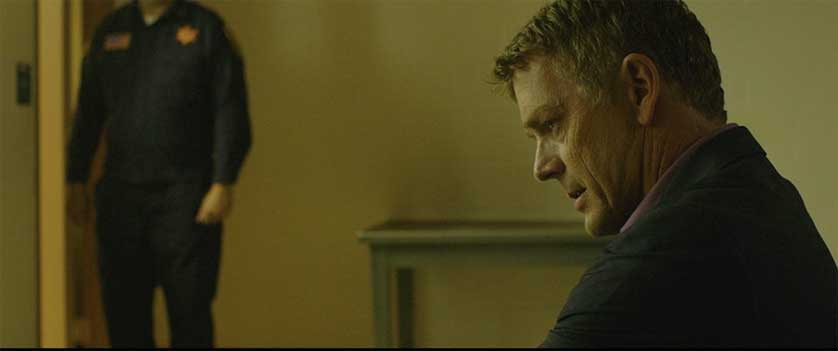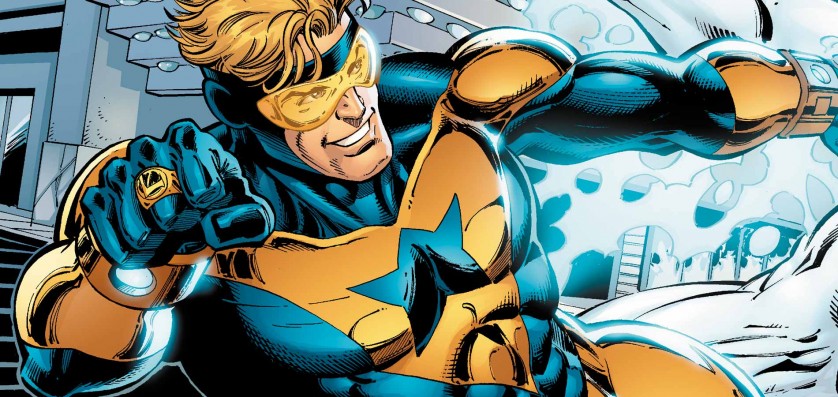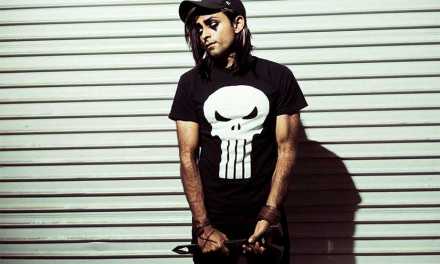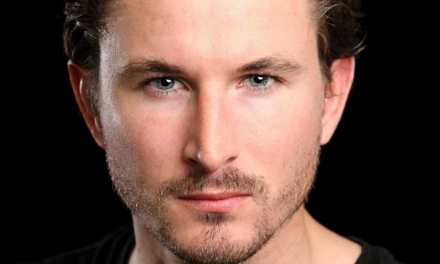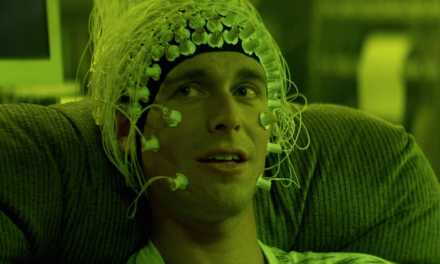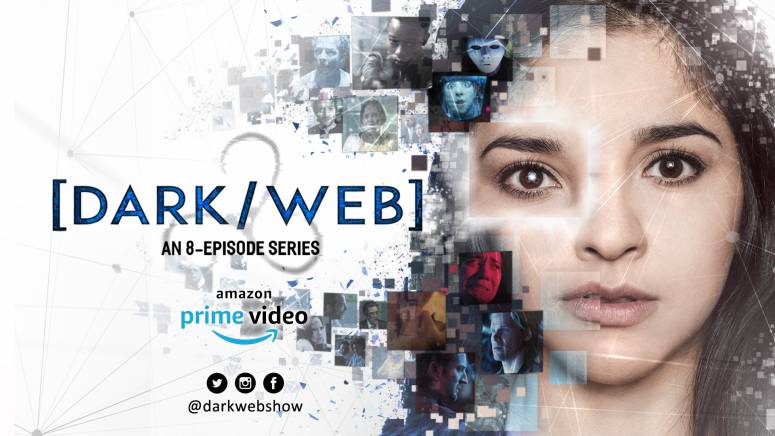
Chasen Schneider and Jordan Salloum Talk ‘Hate Crime’
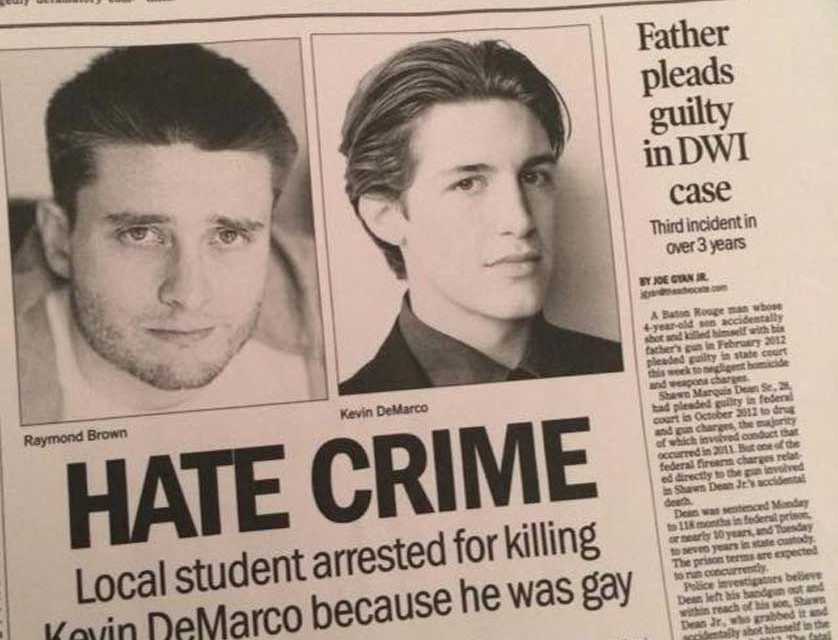
Chasen Schneider and Jordan Salloum star in an upcoming movie title “Hate Crime.” The film revolves around the controversial killing of a young homosexual man by another closeted homosexual man. As the case unfolds we learn that there is more to this film than just a murder, it also touches on family values and the impact of both strong and weak family values that are passed down from generation to generation. Both Chasen Schneider and Jordan Salloum were able to talk with us about this film that was recently submitted to Sundance. You can read the interview below and check out their Facebook page at https://www.facebook.com/hatecrimethemovie/.
Film Fad:
So you guys have a new movie coming out called “Hate Crime.” I believe it had another title before could you tell us what that title was?
Chasen:
Yeah it was “Heartland.”
Film Fad:
So I have to ask, because I spoke with Alicia [Allain] maybe a month or two ago and during that phase when it was going through the change, could you tell us why the change of title?
Chasen:
Who should take this Jordan? You or me?
Jordan:
Go ahead Chasen, you’ve got it.
Chasen:
I think they decide to call it “Hate Crime” because they thought that “Heartland” could be misconstrued in some way. I like “Heartland” and I think it did fit with some of the themes but with “Hate Crime” you definitely know what the movie is about since it does involve a hate crime and it’s a hate crime that tears two different families apart. It forces them to reevaluate themselves and the choices they made in their lives. A lot of the film is about hate, including self- hate. So they thought that would fit the movie and they would get the gist of it from the get go.
Film Fad:
So do you want to tell us briefly about your roles starting with Chasen and then going to Jordan?
Chasen:
I play a young man named Kevin. He’s an artist; he’s going to college in Louisiana. And he meets Jordan … this isn’t in the movie but we decided we meet in an art class. Kevin’s a homosexual and he’s been raised to be very proud of who he is and not hide himself. And I think that’s why sometimes it’s difficult for him with Ray because as much as he loves Ray he doesn’t like having to hide a part of himself, because Ray wants him to.
Film Fad:
And Jordan how about from your perspective?
Jordan:
Yeah. I play Raymond Brown. And like he said, my character is a little different. He’s not as brave as Kevin who is Chasen’s character. My character is perceived by the outside world as heterosexual. He put on this “masculine”, external vibe, overcompensating, and not appearing to be what people might consider “gay”, because his father would not approve of something like that. My character was a wrestler in high school, a very physical person. Very quiet and I think he was ashamed of who he was. Not because he thought it was bad but his father’s approval was paramount to him and he didn’t want in any way to have his father disapprove of him. And in that way I think he’s not as brave as Kevin. What happens between them you’ll just have to see.
Film Fad:
I know that homosexuality in film is kind of a controversial topic but this touches on an even more controversial topic. I think it’s one of Louisiana’s laws where a hate crime is subject to the death penalty and regardless of it being a murder, if it’s a hate crime, it’s held in a higher regard. Chasen I know there’s a little bit of a personal side when it comes to Louisiana but could you each tell me from your perspective how this film may have affected you personally?
Chasen:
My dad has a studio in Louisiana. I haven’t lived there, but I know it’s an area with a lot of traditional family values, and I’m not trying to diss traditional values. I think there are a lot of good things in them. But I think one traditional value that has not aged so well is this idea that homosexuality is something that should be shameful or should be shunned. This film is really going to challenge a lot of people, because it’s about a traditional, old-fashioned family in a traditional state. They are forced to come to grips with the fact that their worldview and their family has changed forever, because something that they thought would never happen to them has happened. I think it’s just a film about you can’t deny who you are. And trying to do so will just cause your own self-hate and that hate will bleed out on to others.
Film Fad:
Jordan switching to you, with your character who seems to be hiding his homosexuality due to his traditional values, would you say that the crime committed would be more of that crime of passion and resentment or maybe self-hatred rather than hating Kevin?
Jordan:
Oh absolutely! Yeah I talked with our director Steven Esteb, who by the way is an absolutely fabulous director. But the way I feel about it is that I don’t hate him [Kevin] at all. I just have so much self-hatred toward myself and so much anger towards my father and I’m talking from Raymond’s perspective. No I don’t hate Kevin, he’s the brave one, I admire him. I just think it was tragic that Raymond has to resort to that because he snaps in that second and the anger is not directed at Kevin, it’s towards himself, it’s the anger towards his father. So yeah, I don’t feel he has any resentment towards Kevin. If anything he resents how brave he is.
Film Fad:
Would you say that maybe this film touches on something beyond just accepting yourself but maybe the court system as a whole and maybe how some laws in different states may have different intentions yet in the end it might be questioning how the justice system works? I know that’s a major, social, political question.
Jordan:
Yeah I think it could. To be honest with you, I hadn’t really thought about it a lot. Most of my thoughts have been towards, ‘We are who we are and your son is who he is and you should love him regardless.’ I haven’t really thought about my view on it but yeah that could definitely be something worth discussing.
Chasen:
Yeah it could definitely promote some discussion about it because for one there’s the question of whether you believe the death penalty is ever justified period. Whether it’s still of worth in a modern society, so that’s something that people have different perspectives on. The idea of a hate crime is a layer of intention, which the state deems to be worthy of more attention or more justice. It’s a hard thing to quantify. It seems that people take intention into consideration in legal proceedings. That’s why there’s first-degree murder and then there’s second-degree murder, because it’s a difference of intention. I guess the idea is that first degree is pre-planned murder and second degree is an instant decision and then of course there’s manslaughter. Maybe you didn’t intend to murder someone but it resulted in a death. So intention does seem to be something that is considered in the punishment of a crime but that does raise a lot of philosophical questions. How is it that you can know what someone ever intended when the act is still the act? A guy kills his wife when he finds her cheating on him. Is that not a crime of hate? I guess hate crimes seem to get a bigger punishment because it’s the state’s way of trying to say that we disapprove of crimes against disadvantaged groups more than others. But then someone could argue that there’s never been in history any example of a harsh punishment ever being an effective deterrent.
So yeah I think this could raise a lot of questions about how our justice system works.
Jordan:
You know I should have thought about it too because I’m also a lawyer, I have a law degree. I’m admitted to the bar of Mississippi, I don’t know why I’ve never given that any thought. (Laughs) But yeah, everything Chasen says is pretty dead on.
Film Fad:
Would you say that this film focuses more on accepting one’s self or more on the slippery slopes of hate crime in general.
Jordan:
This film is a character study about how parents deal with their children and the fallout of something terrible happening and how they cope with it. And how they can either grow together or grow apart. I feel that’s the main meat of the film. What do you think Chasen?
Chasen:
It definitely touches on social issues, as well as political ones but I agree with Jordan, the focus of the film is the consequences of your actions. How would this character have turned out if his parents did something different? We all like to think we have total control over our lives and actions, that our decisions are the result of conscious, clear reasons; the effects of our decisions will be known to us. But you have to remember at the end of the day we are physical systems. We’re atoms that make up molecules that make up cells and so physical systems react to things in their environment. So did Ray every really stand a chance given the environment he was in? And I think that’s a question that you need to ask yourself before you make important decisions, because your actions have consequences that affect other people. You don’t exist in a vacuum.¨
Film Fad:
So telling the story from both sides from both families would you say that in a way both characters are victims in a sense?
Jordan:
Oh yeah. Like Chasen just said, Raymond didn’t stand a chance. His father’s approval is about as important as it is to me. And that’s how I related to Raymond because I know if I disappointed my father on that kind of level it would be devastating.
Chasen:
I agree. They’re both victims of a belief that condemns people for being different. And it just goes to show how I think beliefs…they’re systemic. They affect the individual and they affect groups of people because the actions of an individual based off of his belief affects other people because, again, no one exists in a vacuum.¨
Film Fad:
Let me ask you both, was it difficult diving into a role such as these where it’s something that’s so different from yourselves? How did you go about mentally preparing for this role?
Jordan:
It wasn’t for me because as an actor that’s the whole point. You try and stretch yourself; you try and play characters who are different from you. So I wasn’t deterred from that at all. I asked questions so I could understand. For me personally, no it wasn’t a daunting task. We get into acting to explore realities that are different from ours, and live under imaginary circumstances, truthfully.
Chasen:
A trick with characters such as these is to acknowledge their differences but at the same time, find the things that are not different from you. Because you’d be surprised how much you have in common with a character that you think is different than you. I just thought of Ray as someone my character loved. And I hope that we all have someone that we love. We all know at least one person whom we love deeply, but they don’t know how to love themselves; because they don’t love themselves, they succumb to self-hatred, and this hatred convinces them that they are not worthy of other people’s love.
They think to themselves, ‘I’m just going to get it over with and push you away now, because if I don’t push you away and allow you to become close to me, you’ll discover what an awful person I am, and then you’ll just leave me.’
Even though a lot of my physical and life circumstances may be different from Kevin, I was trying to find the core of what his character was about. And if you do that I think you can find a lot to relate to.
Film Fad:
Based on the characters you both play, what would be your take on the audiences’ final take away from the film?
Chasen:
Final takeaway? I think it’s simple, just accept yourself and parents accept your kids. As long as who they are doesn’t hurt anybody … as long as they’re not hurting other people … who they are is who they are. Especially something like sexuality, which is something I really don’t think you can change. And I think if you hate yourself that will affect other people too. It sounds so simple, but just love one another.
Jordan:
I think we label people so much. He is a homosexual, he is a heterosexual, he is a transgender. Raymond is a person, Kevin is a person. They are people and there’s just so much more to them than their sexuality. I feel if we take one thing away then we don’t have to label people and that’s all there is to it. This is a person and he’s a son and he’s a friend and he’s a lover. There’s just so much more to a person than just being a homosexual or being a heterosexual. I think we should just love everybody just like Chasen had said.
Chasen:
Well said Jordan.
Jordan:
You too man.
Film Fad:
When can everyone expect to see this film released?
Chasen:
Sometime next year. It’s officially submitted to Sundance, which is the last week in January through the first week in February. As well as another film we were both in “Anderson Bench” and a couple other films from John Schneider. If you’re at Sundance you can see it there which is if it gets a bid, which I think it will, fingers crossed. And we’re thinking a distributor will pick it up and I think they’ll probably release it later in 2016.
Jordan:
Yeah and it’s a great film. If you get a chance you’ll have to check out our Facebook page and like it just to get the awareness going from it. And as Chasen said “Anderson Bench” and “Like Son”, who I was apart of it, in addition to “Anderson Bench”, will also be submitted to Sundance too. Hopefully you’ll see it at the end of next year, it’s a great story.
Chasen:
Yes, please like the Hate Crime Facebook page. You can find all sorts of updates and information there.
Film Fad:
Well thanks so much guys, I appreciate your time.
Chasen:
Thank you.
Jordan:
Thank you.

